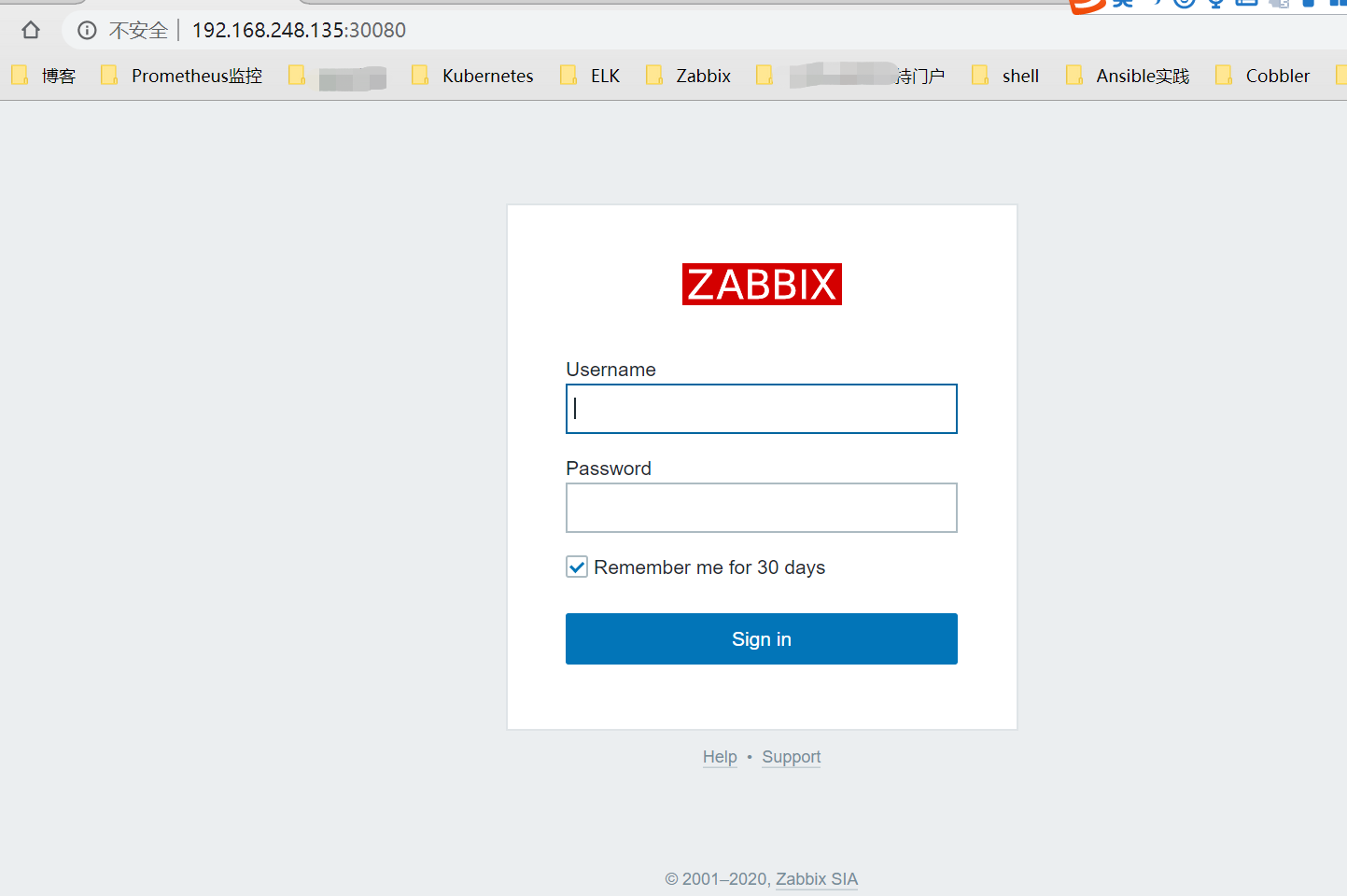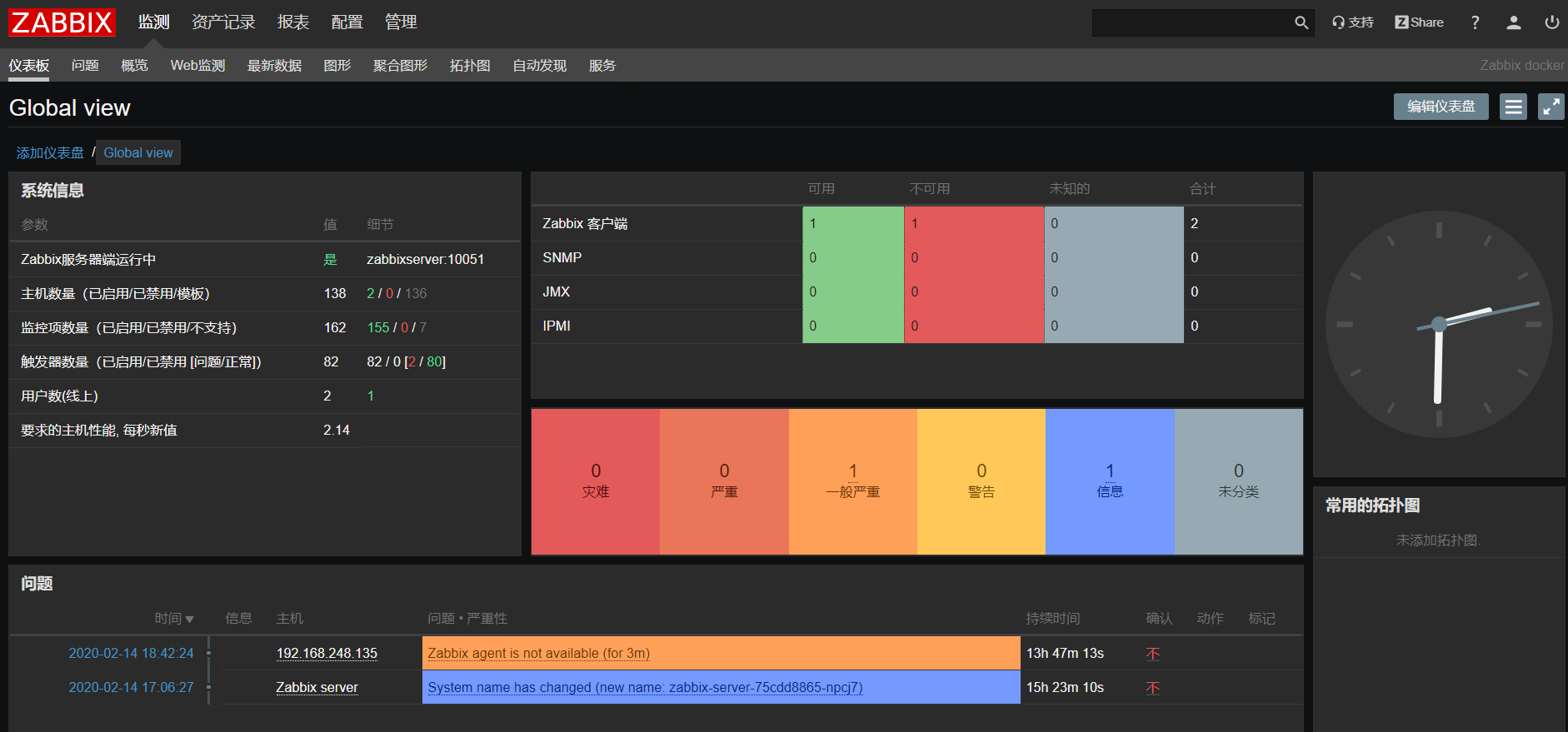Introduction to zabbix
Zabbix is a network monitoring and management system based on Server-Client architecture.It can be used to monitor the status of various network services, servers, network machines, and so on.Zabbix uses MySQL, PostgreSQL, SQLite, Oracle, or IBM DB2 to store data.Server is based on C language and Web front-end is based on PHP.Zabbix can be monitored in a variety of ways.You can use Simple Check only without installing the Client side, or you can use a variety of protocols such as SMTP or HTTP to do life-and-death monitoring.After installing Zabbix Agent in clients such as UNIX and Windows, you can monitor various states such as CPU load, network usage, hard disk capacity, and so on.Zabbix can also use SNMP, TCP, ICMP checks and IPMI, SSH, telnet to monitor targets even if Agent is not installed in the monitoring object.In addition, Zabbix includes various Item alerts such as XMPP.
zabbix feature
Simple installation and deployment
web Visual Management Interface
Open Source
Distributed
Real-time Drawing
Experimental environment
Kubernetes version 1.16.0
zabbix version 4.4.5 (official mirror)
mysql version 8.0.19 (official mirror)
zabbix k8s deployment
Deploy mysql (hostpath for data persistence)
1. Create pv
vim mysql-pv.yaml
kind: PersistentVolume apiVersion: v1 metadata: name: mysql-pv-volume labels: type: local spec: storageClassName: manual capacity: storage: 20Gi accessModes: - ReadWriteOnce hostPath: path: "/mnt/data" --- apiVersion: v1 kind: PersistentVolumeClaim metadata: name: mysql-pv-claim spec: storageClassName: manual accessModes: - ReadWriteOnce resources: requests: storage: 20Gi
2. Create mysql configuration file (configMap)
vim mysql-config.yaml
apiVersion: v1 kind: ConfigMap metadata: name: mysql-config data: custom.cnf: | [mysqld] default_storage_engine=innodb skip_external_locking skip_host_cache skip_name_resolve default_authentication_plugin=mysql_native_password
3. Create mysql password (secret)
[root@k8s-master-01 mysql]# echo -n password|base64 cGFzc3dvcmQ= vim mysql-secret.yaml
apiVersion: v1 kind: Secret metadata: name: mysql-user-pwd data: mysql-root-pwd: cGFzc3dvcmQ=
4. Create mysql deployment file
vim mysql-deploy.yaml
apiVersion: v1 kind: Service metadata: name: mysql spec: type: NodePort ports: - port: 3306 nodePort: 30006 protocol: TCP targetPort: 3306 selector: app: mysql --- apiVersion: apps/v1 kind: Deployment metadata: name: mysql spec: replicas: 1 selector: matchLabels: app: mysql strategy: type: Recreate template: metadata: labels: app: mysql spec: containers: - image: mysql name: mysql imagePullPolicy: IfNotPresent env: - name: MYSQL_ROOT_PASSWORD valueFrom: secretKeyRef: name: mysql-user-pwd key: mysql-root-pwd ports: - containerPort: 3306 name: mysql volumeMounts: - name: mysql-config mountPath: /etc/mysql/conf.d/ - name: mysql-persistent-storage mountPath: /var/lib/mysql - name: timezone mountPath: /etc/localtime volumes: - name: mysql-config configMap: name: mysql-config - name: timezone hostPath: path: /usr/share/zoneinfo/Asia/Shanghai - name: mysql-persistent-storage persistentVolumeClaim: claimName: mysql-pv-claim
5. Deploy mysql using the kubectl command and above yaml files
[root@k8s-master-01 mysql]# kubectl apply -f ./ configmap/mysql-config created service/mysql created deployment.apps/mysql created persistentvolume/mysql-pv-volume created persistentvolumeclaim/mysql-pv-claim created secret/mysql-user-pwd created
Deploy zabbix-server
vim zabbix-server-deploy.yaml
apiVersion: v1 kind: Service metadata: name: zabbixserver spec: type: NodePort ports: - port: 10051 nodePort: 30051 protocol: TCP targetPort: 10051 selector: app: zabbix-server --- apiVersion: apps/v1 kind: Deployment metadata: name: zabbix-server spec: replicas: 1 selector: matchLabels: app: zabbix-server template: metadata: labels: app: zabbix-server spec: containers: - name: zabbix-server image: zabbix/zabbix-server-mysql imagePullPolicy: IfNotPresent ports: - containerPort: 10051 name: server protocol: TCP readinessProbe: tcpSocket: port: server initialDelaySeconds: 5 periodSeconds: 10 livenessProbe: tcpSocket: port: server initialDelaySeconds: 15 periodSeconds: 20 env: - name: DB_SERVER_HOST value: "mysql" - name: MYSQL_USER value: "zabbix" - name: MYSQL_PASSWORD value: "zabbix" - name: MYSQL_DATABASE value: "zabbix" - name: ZBX_CACHESIZE value: "1024M" - name: ZBX_TRENDCACHESIZE value: "1024M" - name: ZBX_HISTORYCACHESIZE value: "2048M" - name: ZBX_HISTORYINDEXCACHESIZE value: "1024M" - name: ZBX_STARTTRAPPERS value: "5" - name: ZBX_STARTPREPROCESSORS value: "10" - name: ZBX_STARTDBSYNCERS value: "10" - name: DB_SERVER_PORT value: "3306" - name: zabbix-agent image: zabbix/zabbix-agent imagePullPolicy: Always ports: - containerPort: 10050 name: zabbix-agent env: - name: ZBX_HOSTNAME value: "Zabbix server" - name: ZBX_SERVER_HOST value: "127.0.0.1" - name: ZBX_PASSIVE_ALLOW value: "true" - name: ZBX_STARTAGENTS value: "3" - name: ZBX_TIMEOUT value: "10" securityContext: privileged: true
Deploy zabbix-web
vim zabbix-web.yaml
apiVersion: v1 kind: Service metadata: name: zabbix-web spec: type: NodePort ports: - port: 80 protocol: TCP nodePort: 30080 targetPort: 80 selector: app: zabbix-web --- apiVersion: apps/v1 kind: Deployment metadata: name: zabbix-web spec: replicas: 2 selector: matchLabels: app: zabbix-web template: metadata: labels: app: zabbix-web spec: containers: - image: zabbix/zabbix-web-nginx-mysql name: zabbix-web imagePullPolicy: IfNotPresent ports: - containerPort: 80 name: web protocol: TCP env: - name: DB_SERVER_HOST value: "mysql" - name: ZBX_SERVER_HOST value: "zabbixserver" - name: MYSQL_USER value: "zabbix" - name: MYSQL_PASSWORD value: "zabbix" - name: TZ value: "Asia/Shanghai"
Deploy using the kubectl command and above yaml files
[root@k8s-master-01 zabbix]# kubectl apply -f ./ service/zabbixserver created deployment.apps/zabbix-server created service/zabbix-web created deployment.apps/zabbix-web created
View the status of deployed components
[root@k8s-master-01 zabbix]# kubectl get deploy,pod,svc,cm,secret,pv,pvc -o wide NAME READY UP-TO-DATE AVAILABLE AGE CONTAINERS IMAGES SELECTOR deployment.apps/mysql 1/1 1 1 15m mysql mysql app=mysql deployment.apps/zabbix-server 1/1 1 1 3m23s zabbix-server,zabbix-agent zabbix/zabbix-server-mysql,zabbix/zabbix-agent app=zabbix-server deployment.apps/zabbix-web 2/2 2 2 3m23s zabbix-web zabbix/zabbix-web-nginx-mysql app=zabbix-web NAME READY STATUS RESTARTS AGE IP NODE NOMINATED NODE READINESS GATES pod/mysql-ffcc44677-g2tlr 1/1 Running 0 15m 10.244.0.126 k8s-node-01 <none> <none> pod/zabbix-server-75cdd8865-rnxhx 2/2 Running 0 3m24s 10.244.0.127 k8s-node-01 <none> <none> pod/zabbix-web-856989975-8k45c 1/1 Running 0 3m23s 10.244.0.128 k8s-node-01 <none> <none> pod/zabbix-web-856989975-hxdfl 1/1 Running 0 3m24s 10.244.1.118 k8s-node-02 <none> <none> NAME TYPE CLUSTER-IP EXTERNAL-IP PORT(S) AGE SELECTOR service/kubernetes ClusterIP 10.0.0.1 <none> 443/TCP 88d <none> service/mysql NodePort 10.0.0.15 <none> 3306:30006/TCP 15m app=mysql service/zabbix-web NodePort 10.0.0.189 <none> 80:30080/TCP 3m23s app=zabbix-web service/zabbixserver NodePort 10.0.0.234 <none> 10051:30051/TCP 3m23s app=zabbix-server NAME DATA AGE configmap/mysql-config 1 15m NAME TYPE DATA AGE secret/default-token-7qhlz kubernetes.io/service-account-token 3 88d secret/mysql-user-pwd Opaque 1 15m secret/tls-secret kubernetes.io/tls 2 61d NAME CAPACITY ACCESS MODES RECLAIM POLICY STATUS CLAIM STORAGECLASS REASON AGE VOLUMEMODE persistentvolume/mysql-pv-volume 20Gi RWO Retain Bound default/mysql-pv-claim manual 15m Filesystem NAME STATUS VOLUME CAPACITY ACCESS MODES STORAGECLASS AGE VOLUMEMODE persistentvolumeclaim/mysql-pv-claim Bound mysql-pv-volume 20Gi RWO manual 15m Filesystem
Browser Access Test
Enter ip:30080 for any node in the browser address bar
Enter username and password access
Default user: Admin Default password: zabbix

At this point, the k8s deployment zabbix-server test is complete.
This article does not expand the description of k8s basic environment deployment at the moment, and then specifically describes k8s basic environment deployment at a later time.